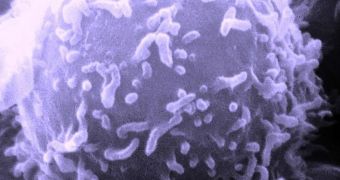In a paper published in the December 5 issue of the top scientific journal Nature Cell Biology, a team of experts presents a new Achilles heel for cancer cells, which they say can be exploited for novel therapies against different forms of cancer.
The group noticed during investigations that these cells are in the habit of discarding a toxic protein, which enables them to cheat a process known as programmed cell death (apoptosis). When this happens, tumors proliferate and spread throughout the body, eventually causing death.
Targeting these proteins could prove to be a new way of going about treating cancer. The new work was carried out by experts with Edinburgh Cancer Research UK Center, which is based at the University of Edinburgh.
In the new study, the team learned that the protein FAK is very detrimental to tumor cells, especially in combination with another protein, called SRC. Whenever the two are found in sufficient amounts in cancer cells, apoptosis occurs.
In a series of experiments, the team removed FAK from the equation in cultured cells, and determined that cancer cells are capable of rounding up and disposing of SRC. This helps them prevent apoptosis, since the proteins are known for their role in triggering the process.
In order to do that, the cells use an innate mechanism called autophagy. Generally, this is used for maintaining a clean cellular environment. Proteins and nutrients are broken to pieces via this process, and their components recycled for later use.
Cancer cells use this process to create small sacks around cellular waste material, but researchers had no idea that this approach can be used to dispose of SRC proteins as well. By blocking FAK and preventing SRC disposal, it may be possible to stop the cancer from spreading.
“We’ve shown that cancer cells can adapt to the problems caused by stress, by hijacking normal cell waste disposal to ‘bag up and bin’ toxic proteins,” says Cancer Research UK scientist and paper author, UE professor Margaret Frame.
“This reveals a previously unknown weak spot in cancer cells – and a potential new pathway to tackle cancer. Combining drugs already in development, which block a protein called FAK, with techniques to stop cancer cells removing excess toxic SRC, would kill them,” she adds.
Escaping apoptosis through a mechanism or another is one of the main traits cancer cells have. This is largely what differentiates them from normal cells. The latter tend to die off as soon as they get old, or suffer damage of any kind.
Conversely, cancer cells continue to multiply even when severely damaged, passing on erroneous genetic information to the next generation, and producing significant cellular anomalies that are eventually fatal.

 14 DAY TRIAL //
14 DAY TRIAL //